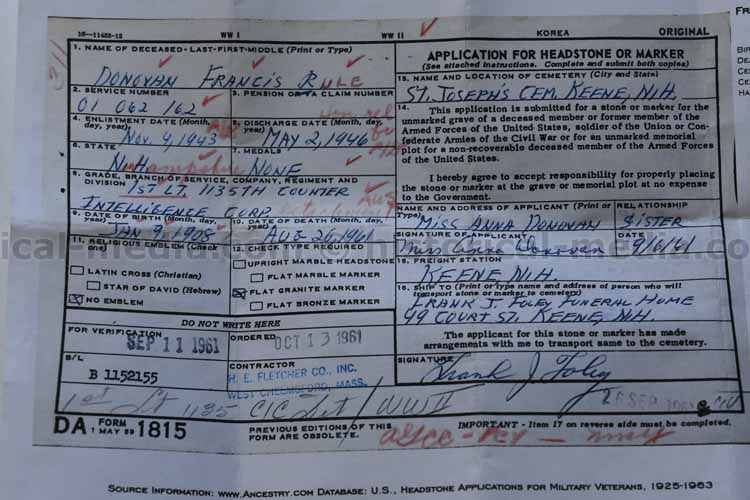163.
WWII Officially
Engraved Purple Heart -
Counter Intelligence
Corps Agent
Officially wartime
government engraved
Purple heart medal in
original case. Named to
Lt. Francis R. DONOVAN
who served in the 1135th
CIC Detachment,
Philippines-Ryukyus
Command.
The United States Army
Counter Intelligence
Corps (Army CIC) was a
World War II and early
Cold War intelligence
agency within the United
States Army consisting
of highly trained
Special Agents.
However the use of
informants within the
Army become politically
controversial, and CIC
was forced to curtail
its activities. In
particular, the CIC was
ordered to cease its
domestic investigations,
to destroy its
investigative records,
and to ship its agents
out to overseas
theaters.[5] The reason
for this sudden and
unprecedented expulsion
has never been
clarified. One leading
theory was expressed in
the official history of
the Corps, “the speed
[of these events] left
little doubt that
someone—possibly
Communists who still
held key positions in
government—was
determined to halt CIC
investigative activities
in the United
States.”[6] Another
possible explanation is
that the CIC mistakenly
bugged the hotel room of
Eleanor Roosevelt and
incurred the President’s
wrath. In any event, the
CIC protected the
investigative records it
had so painstakingly
accumulated. According
to Sayer and Botting (p.
47) “When the command
was given to cease any
investigations of known
or suspected Communists
and destroy all files on
such persons
immediately, eight of
the nine Corps Area
Commanders took the
remarkable step of
disobeying this order.”
According to the
official history of the
Corps, this information
proved highly valuable
in controlling
communism: “the
information acquired by
CIC from May 1941 to
September 1945 regarding
communism and its
adherents played a major
part in keeping
communism under control
in the United States
ever since.”[7]
In the European and
Pacific theaters of
operations CIC deployed
detachments at all
levels. These
detachments provided
tactical intelligence
about the enemy from
captured documents,
interrogations of
captured troops, and
from para-military and
civilian sources. They
were also involved in
providing security for
military installations
and staging areas,
located enemy agents,
and acted to counter
stay-behind networks.
They also provided
training to combat units
in security, censorship,
the seizure of
documents, and the
dangers of booby traps.
In some cases CIC agents
such as Henry Kissinger
found themselves acting
as the de facto military
government on the
occupation of large
towns before the arrival
of Allied Military
Government for Occupied
Territories (AMGOT)
officers. As the war in
Europe came to a close,
CIC were involved in the
Operations Alsos,
Paperclip and TICOM,
searching for German
personnel and research
in atomic weapons,
rockets and
cryptography. Recruits
after World War II
included Klaus Barbie,
also known as the
'Butcher from Lyon', a
former Gestapo member
and war criminal.
$335







